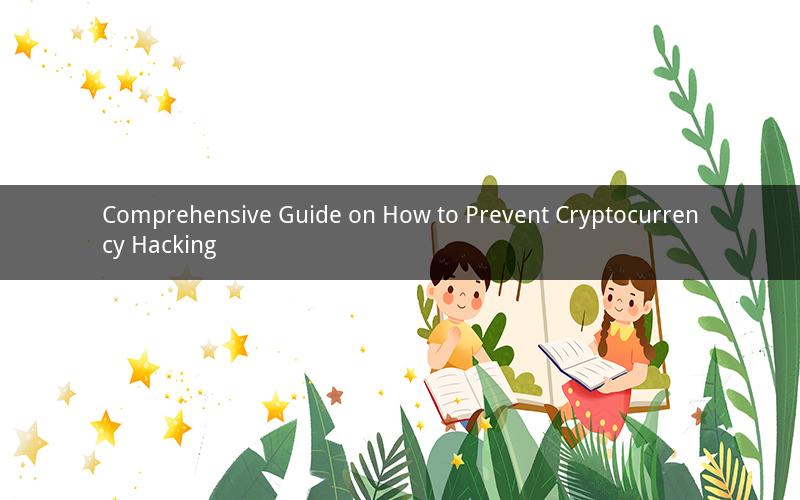
Introduction:
In recent years, the cryptocurrency market has experienced exponential growth, attracting both investors and hackers. As the value of digital currencies continues to rise, the risk of cryptocurrency hacking has become a significant concern. This article aims to provide a comprehensive guide on how to prevent cryptocurrency hacking, ensuring the safety of your digital assets.
1. Use Strong and Unique Passwords:
One of the most effective ways to prevent cryptocurrency hacking is by using strong and unique passwords for all your accounts. Avoid using common words, phrases, or easily guessable information. Instead, create a combination of uppercase and lowercase letters, numbers, and special characters. Additionally, use a different password for each account to minimize the risk of multiple accounts being compromised simultaneously.
2. Enable Two-Factor Authentication (2FA):
Two-factor authentication adds an extra layer of security to your cryptocurrency accounts. By requiring a second form of verification, such as a unique code sent to your phone, you can significantly reduce the risk of unauthorized access. Enable 2FA on all your cryptocurrency exchanges and wallets to ensure maximum protection.
3. Keep Your Software Updated:
Regularly updating your software is crucial in preventing cryptocurrency hacking. Software updates often include security patches that address vulnerabilities exploited by hackers. Make sure to install updates promptly for your operating system, web browsers, and cryptocurrency wallets.
4. Use Secure Internet Connections:
Avoid accessing your cryptocurrency accounts from public Wi-Fi networks, as they are often unsecured and vulnerable to hacking. Instead, use a secure and encrypted VPN connection to protect your data while online. A VPN masks your IP address and encrypts your internet traffic, making it difficult for hackers to intercept your sensitive information.
5. Be Wary of Phishing Attacks:
Phishing attacks are one of the most common methods used by hackers to gain access to cryptocurrency accounts. Be cautious of emails, messages, or calls that request your login credentials or personal information. Always verify the sender's identity before providing any sensitive information. Additionally, use anti-phishing software to detect and block fraudulent attempts.
6. Utilize Hardware Wallets:
Hardware wallets are considered the most secure form of storing cryptocurrencies. Unlike software wallets, hardware wallets store your private keys offline, making them immune to online threats. Invest in a reputable hardware wallet and follow the manufacturer's guidelines to ensure proper usage and security.
7. Backup Your Cryptocurrency Wallets:
Regularly backup your cryptocurrency wallets to prevent data loss and potential hacking. Store backups in multiple secure locations, such as external hard drives or cloud storage services. Ensure that your backups are encrypted and only accessible to authorized individuals.
8. Stay Informed About Security Best Practices:
Keep yourself updated with the latest security best practices and trends in the cryptocurrency industry. Follow reputable sources, attend webinars, and join online communities to stay informed about potential threats and preventive measures.
9. Educate Yourself on Common Scams:
Educate yourself about common cryptocurrency scams, such as Ponzi schemes, phishing attacks, and fake exchanges. By understanding these scams, you can recognize them and avoid falling victim to them.
10. Monitor Your Accounts Regularly:
Regularly monitor your cryptocurrency accounts for any suspicious activity. Set up alerts for unusual transactions or login attempts. If you detect any unauthorized activity, report it immediately to your exchange or wallet provider.
Frequently Asked Questions:
1. Q: Can I prevent cryptocurrency hacking completely?
A: While it is impossible to guarantee 100% security, following the above steps can significantly reduce the risk of cryptocurrency hacking.
2. Q: Are all cryptocurrency exchanges equally secure?
A: No, the level of security varies among different exchanges. It is crucial to research and choose reputable exchanges that prioritize security measures.
3. Q: Can I use the same password for multiple cryptocurrency accounts?
A: No, using unique passwords for each account is essential to prevent simultaneous hacking of multiple accounts.
4. Q: Is it safe to store cryptocurrencies on a mobile wallet?
A: Mobile wallets can be convenient, but they are more susceptible to hacking compared to hardware wallets. It is recommended to use mobile wallets for smaller amounts and store larger amounts in hardware wallets.
5. Q: Can I recover my cryptocurrency if it is hacked?
A: The possibility of recovering hacked cryptocurrency depends on the severity of the attack and the measures taken by the exchange or wallet provider. It is crucial to report any suspicious activity immediately to increase the chances of recovery.